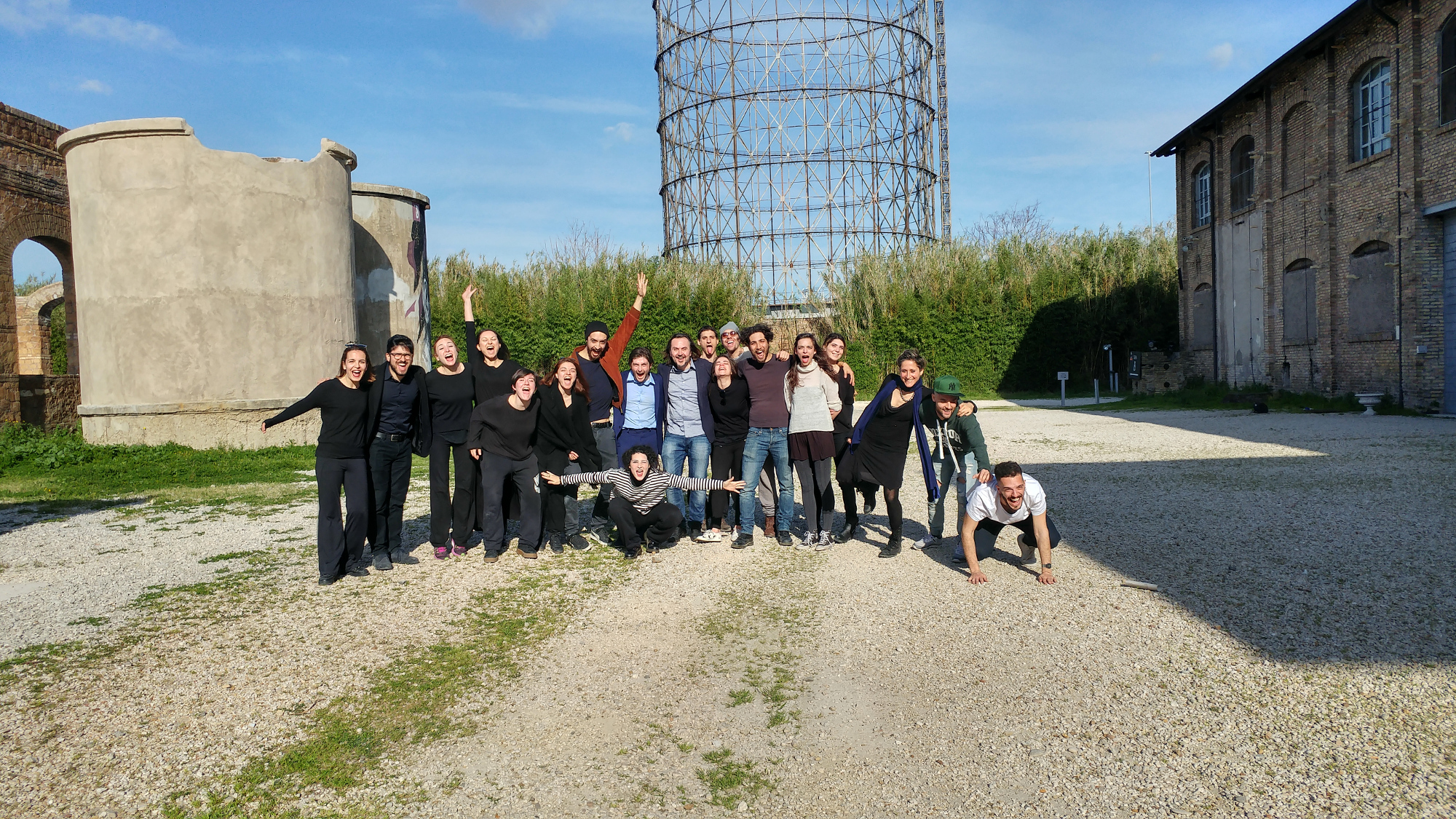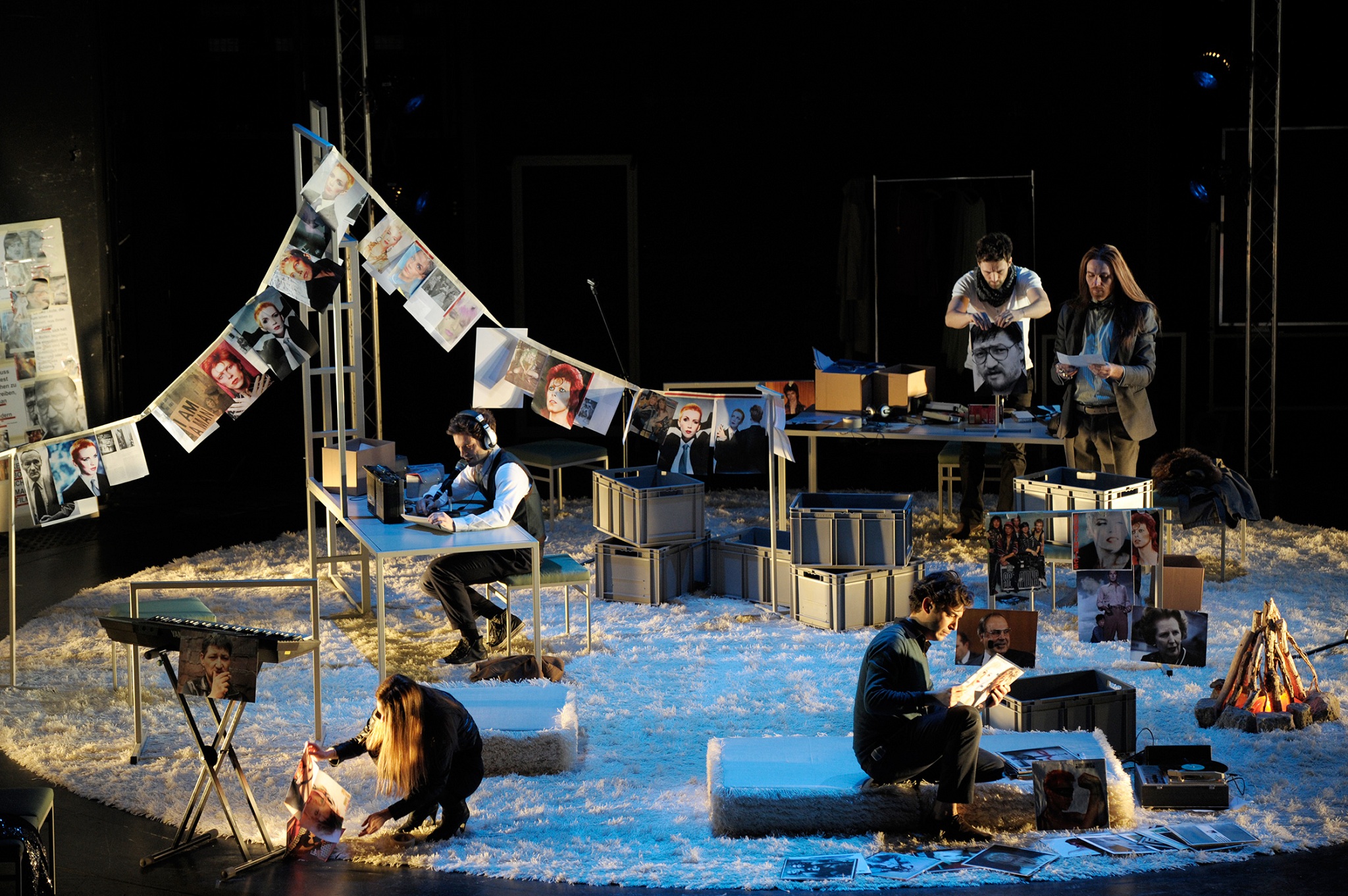KORŠUNOVAS IN ROME. THE QUEEN, THE SERPENT, AND THE REFUGEE INFERNO
In the context of Union des Théâtres de l’Europe (UTE) Decentralised Academy, Lithuanian stage director Oskaras Koršunovas directed a masterclass for young professional actors, organized by the Teatro di Roma in cooperation with the Lithuanian Embassy in Rome (2-12 March 2017), with an opened delivery based on Elfriede Jelinek’s “Charges (The Supplicants)”. An account from inside the workshop.

It’s a bright early spring day in Rome, not a cloud in the sky; a stretched but sweet wind passes through the former industrial site in front of the gasometer. On a Saturday afternoon, the Teatro India is silent, like a desert abbey by the river Tiber, sprinkled with sparkling sun beams.
On my arrival, a bunch of young people sit at a wooden table among the green fences. A technician drags a flight case across the wide white gravel yard; he looks around, leaves the case in the centre, like the carcass of a wild animal captured after a long hunt.
It’s the last day of rehearsals. Ten students of the Acting Training School of the Teatro di Roma, together with six colleagues from five European countries sent by the UTE, are waiting for Oskaras Koršunovas to come back from his lunch break. The Lithuanian stage director—who was invited to give a masterclass as a part of the Conflict Zones network programme, co-founded by Creative Europe—chose to work on Elfriede Jelinek’s text “Charges (The Supplicants)”, translated into English by Gitta Honegger.
An intense laboratory opened its doors on Sunday, 12 March for an itinerant presentation that accompanied the audience inside and all around the Teatro India.
A day earlier, I followed the group through a first and single run-through of the entire voyage. The young actors sit in the Teatro India studio in the light of the afternoon sun; I can hear Italian and some Portuguese and Greek. Koršunovas enters and keeps silent for a long minute, before starting to recap the list of the eighteen scenes that will mark the path of this journey through the “European Inferno”.
The titles for the scenes make a weirdly varied bunch of keywords, such as “mirror”, “the war in the toilet”, “the ship”, “masks”, “the fairy tale”, “the European cow”.
“The structure is there,” Koršunovas concludes, “now we are going to run through every link, don’t worry: any problem is only in your head.”
Speaking with some of the actors, I learn about the first few days of the masterclass, when the director took them through a bulk of psychological inputs, and long talks on political identity, and the refugee crisis.
Now the whole material is going to take on the shape of a chain of performances: the audience will be guided by a sort of Dante’s “Virgil” through the whole area around the venue, facing many different perspectives on migrant flows and European responsibility, crawling as a “serpent” from station to station.
“Egle, The Queen of Serpents” is in fact the title of the project—already presented last autumn at the 13th International Theatre Festival Sirenos in Vilnius and now molded to a different group of performers. It comes from a traditional Lithuanian fairy tale, this time delivered by an actress wearing a burqa, who tells the origin of five trees: oak, birch, ash, poplar and spruce (in Lithuanian, “egle”).
Egle is the name of a young girl who accepts to be given as bride to the King of Serpents. Using a trick, Egle’s brothers will kill the Serpent (who happened to be a fair and gentle human magician) and this will bring Egle to expiate the crime of having revealed the secret, transforming herself and her children into trees. The moral of this fable is that “what comes from the sea stays in the sea and will never be accepted by what grows and lives on Earth”; and the other way around.
Koršunovas uses this folktale as a metaphor for the refugee inferno.
“We are alive, We are alive. The main thing is we live and it hardly is more than that after leaving the sacred homeland. No one looks down with mercy at our train, but everyone looks down on us. We fled, not convicted by any court in the world, convicted by all, there and here.”
These are the very first lines of Jelinek’s text, delivered in a loud voice by the whole group, sitting on chairs placed in the brand new open stage of the Teatro India. The performers are wearing weird colourful masks (such as a chicken, a devil, a rabbit, a clown or a skull); the crowd will disperse, frightened by a young man in a blue suit, who was apparently trying to reassure them. Then the journey begins.
A couple of policemen in black balaclava chasing a ravenous Arlequin across the whole yard will be a sort of leitmotiv to keep the acts of persecution and xenophobia in the spectators’ minds. Yet, the core of this project stays in its variety, in the contrasting tones and styles of the single performances, pushed beyond Jelinek’s play and into the improvisation.
A cynical irony, for example, emerges evidently in the “Hate Fair” scene, where the audience is given a gun and invited to shoot different “samples of junk humanity”: a communist, a homosexual, a “negro” or a Chinese; the same goes for the church scene, where a placid priest would exalt the terrorist attack in Utøya urging the audience to shout “Heil, Breivik!”.
There is something rather cruel in the way the same priest celebrates the wedding between the spectators and the “European cow”—referring to the cow impregnated and kidnapped by Zeus in the founding Greek myth of Europe—, and it also resonates in the corridor scene where Egle wanders through the crowd in search of a God, a hug, a kiss.
As with almost any other Jelinek’s play, “The Supplicants” presents itself as an intimidating flood of words, with neither characters nor lines, and scarcely a full stop and a new paragraph. In Hermann Schmidt-Rahmer’s production at the Schauspielhaus in Bochum in 2016, the spectators were overwhelmed by those words that seven actors and actresses threw from the stage to the stalls.
Koršunovas attempts a new way, going through and beyond the text, cutting the images, tailoring them to an international group of actors and engaging the audience. A perfect form and a refined setting seem not to be the goal of this project, which rather served as a moment of discussion on the opportunities for a new politics of the performance art. By also taking advantage, here and there, of the certainly successful stratagem of physical and verbal explicit violence, the operation preserves its nature: the result of an acting training session, creating a cruel playground where to challenge one’s attention to such worrying drifts as indifference and superficiality.
“We came but we are not here at all.” These words echo inside our minds during the last performance, where horrible footage of starving Africa—not without a hint to Syrian refugees—is projected: the audience is invited to sit in the playhouse, joining one actor bathed in amber light. Keeping a grin on his face, he is compulsively devouring popcorns.
Published on 15 March 2017 (Article originally written in Italian)
